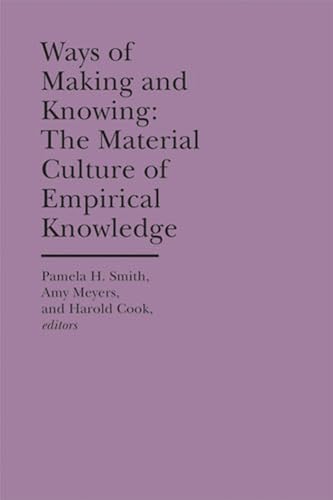Items related to Ways of Making and Knowing (The Bard Graduate Center...
Ways of Making and Knowing (The Bard Graduate Center Cultural Histories of the Material World) - Hardcover

“Making” and “knowing” have generally been viewed as belonging to different types and orders of knowledge. “Craft” and “making” have been associated with how-to information, oriented to a particular situation or product, often informal and tacit, while “knowing” has been related to theoretical, propositional, and abstract knowledge including natural science. Although craftspeople and artists have worked with natural materials and sometimes have been viewed as experts in the behavior of matter, the notion that making art can constitute a means of knowing nature is a novel one. This volume, with contributions from historians of science, medicine, art, and material culture, shows that the histories of science and art are not simply histories of concepts or styles, or at least not that alone, but histories of the making and using of objects to understand the world. The common view of craftspeople more or less mindlessly following a collection of recipes or rules—which are said to be fundamentally different from “science” and “art”—has greatly distorted our understanding of the growth of natural knowledge in the early modern period. More intensive examination of material practices makes it clear that the methods of the artisan represent a process of knowledge-making that involved extensive experimentation and observation, in addition to generalizations about matter and nature. As increasing numbers of people came to be immersed in such activities, whether as craftspeople, medical practitioners, merchants, nobles, magistrates, reformers, collectors, or even scholars, the attributes of “nature” were not only articulated in a variety of ways, and not only seen as a resource for human use, but came to be identified with a variety of “goods.” Knowing nature could of course lead to material betterment but for many, living according to nature’s dictates also led to the development of personal ethics and the public good. As natural knowledge became increasingly important in society in these various ways, it forged new connections among groups, helped create new identities, brought about new kinds of claims to authority and intellectual legitimacy, and gave rise to new ways of thinking about the senses, certainty, and epistemology. None of this could have happened without the conversations and controversies that enabled the assessment of objects in novel ways.
"synopsis" may belong to another edition of this title.
Harold J. Cook is the John F. Nickoll Professor of History at Brown University.
Amy R. W. Meyers is the Director of the Yale Center for British Art.
"About this title" may belong to another edition of this title.
- PublisherUniversity of Michigan Press
- Publication date2014
- ISBN 10 0472119273
- ISBN 13 9780472119271
- BindingHardcover
- Number of pages448
Buy New
Learn more about this copy
Shipping:
US$ 3.99
Within U.S.A.
Top Search Results from the AbeBooks Marketplace
Ways of Making and Knowing (The Bard Graduate Center Cultural Histories of the Material World) Smith, Prof. Pamela H.; Meyers, Prof. Amy and Cook, Harold
Book Description Hardcover. Condition: New. Brand new copy. Seller Inventory # 16008

